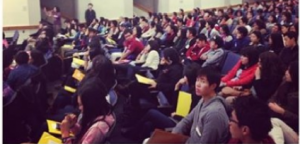 A new report from the Asian & Pacific Islander American Scholarship Fund (APIASF) has found that low income AAPI students turn to their peers for advice more than support programs on campus.
A new report from the Asian & Pacific Islander American Scholarship Fund (APIASF) has found that low income AAPI students turn to their peers for advice more than support programs on campus.
It also found that parents support their children’s education, but don’t really understand what the student’s face.
Diverse Issues in Higher Education reports that researchers found that perceived barriers prevent these students from seeking advice from guidance counselors and other structured campus programs.
38 percent of the respondents complained that such programs were ineffective because of the lack of personalized focus. Others are unaware such help even exists.
“What is apparent is that academically motivated, leadership-driven, low-income and first-generation AAPI students want [advisers] that are genuine, care about them as individuals and develop personal relationships with them,” the report states. “Collaborative efforts between academic and student affairs departments such as multicultural affairs, residence life and counseling centers may assist in addressing this need.”
The survey was given to past recipients of scholarships from APIASF.
You can read a further analysis of the findings in Diverse Issues in Higher Education.

